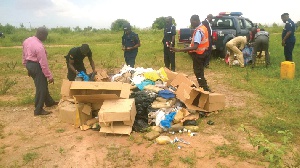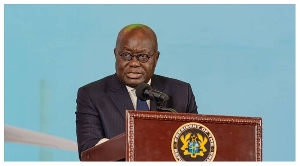Regional News of Tuesday, 28 June 2016
Source: thechronicle.com.gh
Ashaiman tops narcotic trade in Greater Accra Region
Esinam Ansah Offei, Greater Accra Narcotics Control Board (NACOB) Commander, has revealed that Ashaiman tops the region in illicit drug trade and use.
Though she did not mention any figure to buttress her claim, she said most of the persons involved were the youth, who formed the working population of the area.
Mrs. Offei underscored the commitment of the police and her outfit in ensuring that the illicit use of narcotics was reduced to the barest minimum, if not completely eradicated.
She, therefore, called on the religious bodies, traditional leaders and civil organisations to device engagement programmes to occupy the youth.
Failure to check the drug abuse among the youth could increase the high rate of hypertension patients in Ashaiman and the country, she indicated.
Drug addicts are largely unemployed, and because they would be tempted to engage in various criminal activities, Esinam Offei said the stigma that a drug addict could bring to the family was enourmous.
Last Saturday, the world marked the International Day against Drug Abuse and Illicit Drugs, and celebrating the Greater Accra Regional programme in Ashaiman, Esinam Ansah Offei said no youth should believe that illicit drugs could empower them to work above themselves.
She said the consequences of drug addiction were great, and that the economy of Ghana, and the country’s international reputation, would eventually be dented.
This year’s International Day against Drug Abuse and Illicit Drugs was celebrated on the theme: ‘Listen first; drug prevention among the youth and children’, and taking his turn to address the gathering of assembly members, tribal heads, school children and the public, Isaac Djamgbah Vanderpuje, Deputy Greater Accra Regional Minister, was sad that available lands that could have been recreational grounds for the youth had all been sold to developers.
“Today, in Greater Accra, there are no public recreational grounds for our youth. Anytime we read the papers or watch television, it is either an assembly is breaking ground to build a structure or commissioning a facility. The assemblies in Ghana do not invest in sports, and some of these are contributing to the drug challenges in the country,” he said.
Mr. Vanderpuje lamented on how Ashaiman, Nima, and some shanty towns in the region have been tagged as havens for land guards, “and these are guys who use drugs. Their grounds for entertainment have been sold to developers, so they are left with no option.”
He was, however, hopeful that Ghana could win the war against drug trade, should the traditional leaders, religious organisations, educational institutions and civil society groups mentor the youth, and fruitfully engage them in social activities.
NACOB, too, he said, should engage the assemblies in ways of assisting the security agencies to track narcotic traders and users, and also engage the public in education.
Extending his frontiers, Isaac Djamgbah Vanderpuje said security at the West Africa regional borders should be strengthened, in order to make such entry and exit points unattractive for the movement of narcotics.
The Ashaiman Municipal Chief Executive, Ibrahim Baidoo, pointed out that research had shown that a large number of youth from the junior and senior high schools were facing the risk of drug abuse in the country.
Mr. Baidoo, however, noted that Ghana was winning the war against drug trafficking and its use in the country, therefore, he commended NACOB for their good work to save the country.
Ibrahim Baidoo hoped that the government’s enrolment of youth programmes should help reduce the drug menace.











